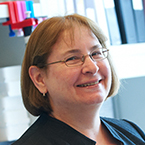
For illuminating the role of homologous recombination in maintaining genetic stability, demonstrating the crucial role of BRCA1 and BRCA2 in facilitating such genetic events and for proving that BRCA2 loss, coupled with aberrant p53 activity in breast cells, can result in replication stress and subsequent tumorigenesis.
An internationally lauded expert in cancer genetics, Dr. Jasin is revered for her lifesaving research focused on defining the role of homologous recombination in maintaining genetic stability. Devoted to deconvoluting the genetics of breast cancer, she has demonstrated the crucial role of breast cancer suppressors BRCA1 and BRCA2 in facilitating homologous recombination to repair DNA breaks, proving that BRCA2 loss coupled with aberrant p53 activity in breast cells, results in replication stress and subsequent tumorigenesis. Dr. Jasin’s laboratory was also among the first to conduct gene editing experiments, a method she used to evaluate chromosomal DNA breaks. She generated a single DSB in the genome of a mammalian cell line and then examined repair, demonstrating conclusively that homologous repair is a major repair pathway in mammalian cells. Subsequently she revealed that BRCA1 and BRCA2 proteins are critical for homologous recombination to repair DNA breaks though mechanistically, these proteins impinge on different steps in the pathway, where BRCA1 and BRCA2 tumors retain both distinct and overlapping second site mutations that affect cancer therapy resistance.
Moreover, her laboratory has provided novel insights into the critical occurrence of replication stress arising from loss of BRCA2 and the involvement of p53. Her groundbreaking research has demonstrated that BRCA2 loss, coupled with aberrant p53 activity in breast cells can result in replication stress and subsequent tumorigenesis. Currently, Dr. Jasin’s laboratory is focused on a wide range of investigational areas such as understanding DNA repair in the breast at different developmental stages and contexts, illuminating meiotic and germline recombination and determining factors that govern “partner choice”, the choice of which two DNA molecules to recombine, identifying protein components involved in the repair process, and developing technologies to facilitate the study of DNA repair and genome manipulation, altogether further contributing to the understanding of human disease, and potentially to its reversal through genetic correction.
Selected Awards and Honors
2019 Shaw Prize in Life Sciences and Medicine, The Shaw Prize Foundation, Kowloon, Hong Kong
2018 Basser Global Prize, Basser Center for BRCA, Abramson Cancer Center, University of Pennsylvania, Philadelphia, Pennsylvania
2017 Elected Fellow, American Academy of Arts and Sciences, Cambridge, Massachusetts
2015 Elected Member, National Academy of Sciences, Washington, DC
2015 Mendel Medal, Mendel Museum, Masaryk University, Brno, Czech Republic
1992-1995 Pew Scholar for Biomedical Sciences, The Pew Charitable Trusts, Philadelphia, Pennsylvania
1991-1993 Beckman Young Investigator, Arnold and Mabel Beckman Foundation, Irvine, California
1985-1987 Fellow, Jane Coffin Childs Memorial Fund for Medical Research, New Haven, Connecticut
1978-1979 Graduate Fellow, The Honor Society of Phi Kappa Phi, Baton Rouge, Louisiana